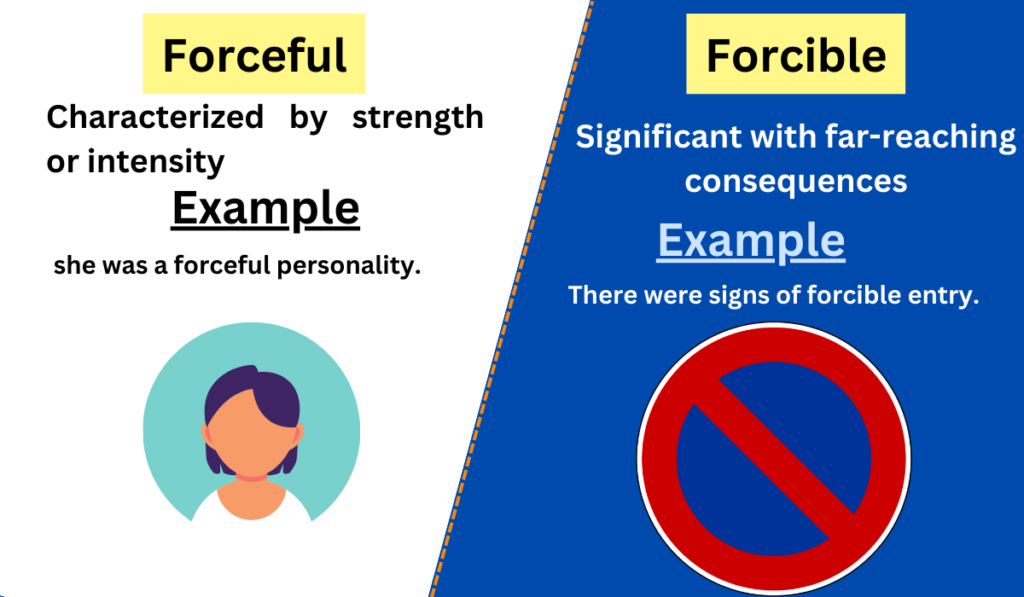Forceful vs. Forcible-Difference between and example
The words “forceful” and “forcible” may appear similar, but they carry distinct meanings and nuances in the English language.

Understanding the difference between these two terms is essential for effective communication and accurate expression.
This article aims to clarify the contrasting definitions of “forceful” and “forcible,” providing practical examples and insights to help you use these words appropriately in various contexts.
Meanings and Examples
Forceful Definition
The definition of forceful
Definition: “Forceful” is an adjective that describes something characterized by strength, power, or intensity. It denotes a compelling or persuasive impact.
Examples of Forceful
- “She delivered a forceful speech that resonated with the audience.”
- “The storm unleashed a forceful wind, causing trees to sway and debris to scatter.”
- “The boxer delivered a forceful punch, knocking his opponent to the ground.”
Forcible Definition
The definition of forcible
Definition: “Forcible” is an adjective that refers to something achieved or done through the use of force or coercion. It suggests an element of physical or legal compulsion.
Examples of Forcible
- “The police used forcible measures to apprehend the suspect.”
- “They gained entry to the building through forcible entry, breaking down the door.”
- “The government issued a forcible evacuation order in response to the approaching hurricane.”
Difference between Forceful and Forcible
| Category | Forceful | Forcible |
| Meaning | Characterized by strength or intensity | Achieved or done through force or coercion |
| Example | “She delivered a forceful speech that…” | “The police used forcible measures to…” |
| Usage | Describes strength, power, or intensity | Describes the use of force or coercion |
| Context | Communication and impact | Law enforcement and physical compulsion |
Usage in a Paragraph
The forceful waves crashed against the rocky shore, their powerful impact reverberating through the air.
The surfers skillfully rode the waves, harnessing the forceful energy of the ocean.
In a different context, the police executed a forcible arrest, employ necessary measures to subdue the suspect.
The handcuffs were secured firmly, ensuring the individual’s compliance. In both instances, the notions of forceful and forcible manifested, albeit in distinct ways. The waves embodied strength and intensity, while the arrest exemplified the use of physical compulsion within the boundaries of the law.
Distinguishing between “forceful” and “forcible” allows for precise and accurate communication.
“Forceful” describes something characterized by strength, power, or intensity, while “forcible” refers to actions achieved through force or coercion.
By recognizing their unique meanings and contexts, we can convey our thoughts effectively and avoid any potential confusion.
So, whether you’re emphasizing impactful words or considering situations involving the use of force, understanding the difference between “forceful” and “forcible” enables clearer and more accurate communication.






Leave a Reply